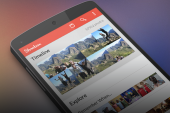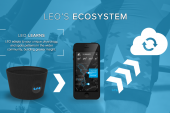
It’s time for you to start looking at your band as a brand and your music as a product. That is if you want to move out of your shoddy shared rental unit and stop romanticizing the starving artists’ life. The DIY-approach isn’t what it used to be – it’s less punk rock and more business now, but its significance has grown. Music is easier to access and consume than ever before, we already know this, but bands need to take notes from entrepreneurs if they want to increase their level of success. They need to become artistpreneurs.
An artistpreneur is one part business, one part artist. It’s someone that takes control of their own work and does things on their own terms, but creates a business model that allows them to sustain their art. The Rise of the ‘Artistpreneur’ and Entertainment 2.0 panel at North By Northeast Interactive highlighted this significance and provided ample tips on how musicians can adjust their approach. From crowdfunding to (gasp!) giving away professionally produced music for free to utilizing fans as promotional tools, there are endless ways to change your perspective and make at least a better living doing what you love.
1) Look at your band as a business
It’s simple: you want to get results like a business? Then act like a business. Bands need to see themselves as a brand and a service, one that provides value to its customers through its product — aka music. Yes, this may be a less-than-sexy approach to music but you don’t have to don suits just yet. How?
Set goals. We want to increase show attendance by X per cent. We want to record a new album by August. We need X amount of dollars to do this. We want to rebrand our band. We need a new website before tour.
Collaborate. Bring people in who can help you reach your goals while you maintain control or your music. “People make things more complicated by trying to reinvent the wheel when you don’t need to,” says panelist Jayson Gaignard, a serial entrepreneur and founder of eMastery.com and TicketsCanada.com. Try re-engineering by studying the success of other artists and bands and follow their methods backward. In theory this should work, but there is no magic formula.
Focus your talent and outsource the rest. “Our time is better suited to making music,” says panelist Matt Fullbrook, bassist of KC Roberts and the Live Revolution and the manager of the Clarkson Centre for Business Ethics and Board Effectiveness. “We acquire as many skills internally so we don’t have to spend our money on those things. Rather, we spend our money on things we can’t duplicate inside.”
Try to have an understanding of all aspects of your craft so you can choose and communicate with the best people to help you. Think engineering, album artwork and sales.
Divvy up administrative tasks amongst band members. Assigning business related roles (social media, grant applications, media contacts, etc) in addition to music roles helps save money and ensures tasks get done. Worst case, hire people for major administrative tasks. KC Roberts is a huge collective, so they pay people (managers, publicists) to make sure band members are available for events and don’t run away to other bands.
2) Strategize what to give away for free
“We’re creating this value on free content in order to build a brand,” says moderator Alex Metcalfe, editor of TicketsCanada.com. “This has become a core strategy for success.”
Like it or not, most people are perfectly content not paying a cent for music. Panelist D-Sisive’s major success stems from the two albums he gave away for free, one of which Jonestown 2 was nominated for a Juno and long-listed for a Polaris Music Prize. “It wasn’t meant to be a strategy from day one. I had put out two retail records and they were getting attention, but it wasn’t until I put out my free record when people really reacted. The free record ended up being the most important of any of the records I had put out,” he says. His real name is Derek Christoff.
“We put as much work into those free records as we put into the retails and people saw that and it reflected in the success of it.”
“Attention is the new currency,” Gaignard says. He says it’s all about landing real estate in people’s minds — minds that are bombarded constantly with advertising and messaging. “The game is changing and if you want to stay afloat you have to change your mindset. If you want to change your business, relationships, life in general you should focus on trying to provide value to others for free.”
Don’t give it all away though. You need to distinguish what you produce for free and what you produce for revenue. Make sure there’s a difference between the two. D-Sisive never plays a show or gives merchandises away for free and his fans consistently pay $5 to $10 per ticket.
“We’ll generate free content when we’re confident it will result in new cash revenue. It’s strategic with a concrete outcome for us. We can’t create anything without money,” Fullbrook says.
3) Reinvest in yourself
Once you have a revenue system in place make sure you’re putting it back into the band. “If we don’t constantly reinvest everything that we make (partly money, partly skills) then we won’t move anywhere,” Fullbrook says.
4) Crowdfund
Be like any other business and ask your friends, family and fans to help fund your project. “Crowdfunding is basically threatening people by saying there’s not going to be an album if you don’t pay for it,” Fullbrook says.
When KC Roberts set out to record their latest album Parkdale Funk 2 they estimated it would cost $30,000. They applied for grants and raised some money through shows before realizing they could likely generate $20,000 through crowdfunding. They raised $26,000 and took it back to Factor to secure the rest. They built their own backend e-commerce system, but bands should also consider crowdfunding sites such as Pledge Music and IndieGoGo.
This isn’t a Field of Dreams situation though. There is no fairy-tale baseball field.
“Part of the reason for the success of the initiative is we created a whole whack of free content in terms of interesting content such as cool covers we put on YouTube,” Fullbrook says. “The free content was a catalyst for a lot of this. It was completely separate from what was sold, but it ended up being a real momentum builder.”
It takes effort, baby. Tiered incentives are also a great way to get funds you normally wouldn’t, whether you have two tiers or ten. Twenty bucks for an album AND a free download as soon as its mastered? Sign me up.
5) Be persistent
Learn how to market yourself to media, labels, industry professionals and fans. “Persistence doesn’t mean people will get back to you, but it means they’ve heard your name a few times. Name recognition matters and the only way to do that is through spam,” Fullbrook says.
6) Learn from your mistakes
Talk to any entrepreneur and they’re going to mention failure. It’s like erotic literature to them, seriously. Bands need to account for their failures and learn from them.
No one at your show? #Fail. No album sales? #Fail.
“The fear of failure induces fear to fail,” Gaignard says. “It’s better to do something than nothing at all. Starting something and progressing helps you overcome that fear. If you sit down with a pen and paper and assess what’s the worst thing that could happen right now it helps you build momentum.”
Figure out what you’re doing wrong and change it. In the entrepreneurial world this is called the pivot, a change in strategy without a change in vision. It leads to validation. Essentially you need to confirm what people want. Once you do this you can use it to your advantage.
7) Listen to your audience or lack there of
Have you heard of the 1000 True Fans theory? It was coined by Kevin Kelly, who says:
“A creator, such as an artist, musician, photographer, craftsperson, performer, animator, designer, videomaker, or author – in other words, anyone producing works of art – needs to acquire only 1,000 True Fans to make a living. A True Fan is defined as someone who will purchase anything and everything you produce. They will drive 200 miles to see you sing. They will buy the super deluxe re-issued hi-res box set of your stuff even though they have the low-res version.“
This theory is critically debated but significant enough to take into consideration when starting to look at your band as a business. If no matter what you do your audience remains stagnant and no new revenue is coming in then its time for a new approach (pivot).
“People actually buying something is the honest truth. Maybe your friends and family won’t tell you your music is crap, but when people actually buy your music they’re voting with their wallets,” Gaignard says.
“At the same time, there has to be this perseverance. Harley [Morenstein] from Epic Meal Time had ten failed YouTube channels before they made Epic Meal Time and now it’s the tenth largest YouTube channel of all time. If you really feel in your heart that it’s great stuff and you have a small following then that validates it. You just have to go through the trenches and keep working. But if at the end of the day no one is buying your stuff, then maybe you should change your job.”
____
Sheena Lyonnais is Toronto Standard’s tech and business editor. You can follow her on Twitter at @SheenaLyonnais.
For more, follow us on Twitter @TorontoStandard or subscribe to our newsletter.














